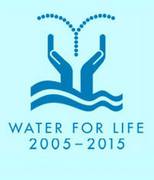/regions/india
India
Job openings from "Water and Sanitation Program (WSP)"
Posted on 12 Jan, 2011 03:56 PMForwarded to the portal by : Solutionexchange
- Short Term Consultant to Support Operations and Research in Rural Sanitation
- Short Term Consultant to Support Capacity Building
- Short Term Consultant (Rural Sanitation and Water)
Nominations invited for Parivartan 2011 Awards for Sustainability and Innovation in Products, Process and facilities
Posted on 12 Jan, 2011 12:55 PMParivartan Awards for Sustainability and Innovation 2011 recognize and showcase such companies that have used innovation for making their products, processes, facilities and operations sustainable.
The Parivartan Awards will be announced at Parivartan 2011, India’s only forum to focus exclusively on driving adoption for sustainability initiatives in businesses by promoting the business case with decision makers both on the production side as well as on the consumption front. It is the forum of choice to promote sustainably driven market development and innovation.
December 2010 - January 2011: "Dams, Rivers and People" - The SANDRP newsletter
Posted on 11 Jan, 2011 01:00 PM The SANDRP newsletter for December 2010 - January 2011 continues its critical analysis of dams, irrigation and related issues:
The SANDRP newsletter for December 2010 - January 2011 continues its critical analysis of dams, irrigation and related issues:
- Water Crisis in Ramsar Wetlands of India
- India dodged UN to get climate credits?
ICID WatSave Awards 2011 - Invitation for nominations
Posted on 11 Jan, 2011 09:17 AMContent and Image Courtesy: International Commission on Irrigation and Drainage (ICID)
It is great pleasure to announce that ICID is inviting nominations for the WatSave Awards 2011 from individuals/ team working in the area of irrigation, drainage and flood management.
17-30 percent hike in wages under Mahatma Gandhi NREGA - PIB Release
Posted on 10 Jan, 2011 04:49 PMArticle Courtesy: Press Information Bureau
The wage rates under MGNREGA have been increased by the Ministry of Rural Development with effect from 1st January 2011. This will result in 17-30% enhancement of wages under the premier flagship program of the UPA Government across the country. This was announced by the Union Minister for Rural Development and Panchayati Raj Dr. C.P.Joshi at a Press Conference in Krishi Bhawan here today.
Ministry of Environment and Forests Announces Coastal Regulation Zone (CRZ), 2011 and Island Protection Zone, 2011 - PIB Release
Posted on 10 Jan, 2011 04:42 PMArticle Courtesy: Press Information Bureau
The Minister of State for Environment & Forests, Independent Charge Shri Jairam Ramesh today issued the following statement in a Press Conference in New Delhi. In the Press Conference, he announced Coastal Regulation Zone (CRZ) Notification, 2011 and Island Protection Zone (IPZ) Notification, 2011.
Apotheosis of water and its inevitability in Indian culture - Paper presented at the National Seminar on Water and Culture (2007)
Posted on 09 Jan, 2011 11:23 PMThis paper highlights the role and value of water in ancient times. The author begins with analysing the discussion on water in the Rig Veda and it's deification. The paper points out to the link between various Hindu gods and water. Social mores in the context of water use is also highlighted, taboos like no nude bathing in rivers and no excretion into such water bodies is pointed out.
Sanitation is sexy challenge : Winners announced
Posted on 07 Jan, 2011 10:54 AMArticle and Image Courtesy: Acumen Fund
Author: James Wu
 The judges votes are in, and we’re excited to announce the winners for the Search for the Obvious Sanitation is Sexy challenge.
The judges votes are in, and we’re excited to announce the winners for the Search for the Obvious Sanitation is Sexy challenge.
“Water for Life” Best Practices Award
Posted on 06 Jan, 2011 04:01 PMForwarded to the portal by IISD
Content and Image Courtesy: International Council for Local Environmental Initiatives
The United Nations Office to Support the International Decade for Action “Water for Life” 2005-2015/UN-Water Decade Programme on Advocacy and Communication (UNW-DPAC) and the UN World Water Assessment Programme (WWAP) are pleased to invite you to submit your Best Practice for the 1st edition of the “Water for Life” Best Practices Award.
Water-Focused Adaptation to Climate Change - Online Courses
Posted on 06 Jan, 2011 03:06 PMContent and Image Courtesy: The Center for Sustainable Development

CSDi is announcing the January launch of a module of four online field courses on Adaptation to Climate Change. These courses begin by introducing basic climate change concepts, and develop as participants identify local community vulnerabilities, investigate appropriate solutions, develop full projects, launch and manage them.